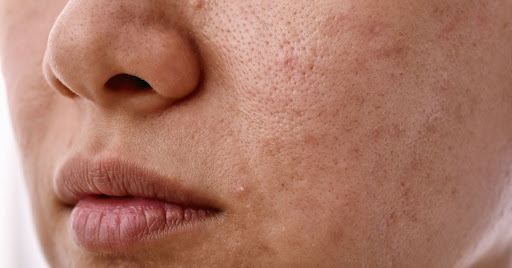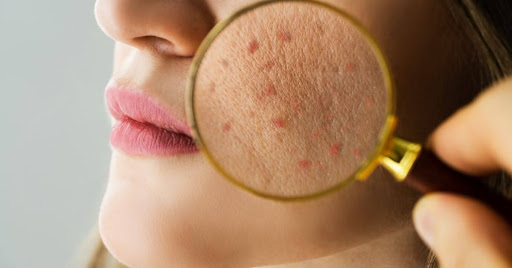Can Stress Affect Your Skin? Understanding the Link Between Stress and Skin Problems
4 min read
By DocGenie , Published on - 30 March 2025 We often hear about the effects of stress on our minds and bodies, but what about its impact on the skin? From acne flare-ups to mysterious rashes, stress can play a significant role in many dermatological conditions. If you’ve ever wondered, “Can stress cause skin problems?” or experienced skin changes during periods of high anxiety, you're not alone.
We often hear about the effects of stress on our minds and bodies, but what about its impact on the skin? From acne flare-ups to mysterious rashes, stress can play a significant role in many dermatological conditions. If you’ve ever wondered, “Can stress cause skin problems?” or experienced skin changes during periods of high anxiety, you're not alone.In this article, we explore how stress affects your skin, common stress-related skin conditions, and what you can do to manage them effectively.
How Stress Affects the Skin
 Stress is the body’s natural response to challenging or threatening situations. It triggers a cascade of hormonal changes—particularly an increase in cortisol, the body’s primary stress hormone. Cortisol affects multiple systems, including your skin.
Stress is the body’s natural response to challenging or threatening situations. It triggers a cascade of hormonal changes—particularly an increase in cortisol, the body’s primary stress hormone. Cortisol affects multiple systems, including your skin.Here’s how it impacts skin health:
- Increased oil production: Cortisol stimulates sebaceous glands to produce more oil, which can clog pores and lead to acne or stress pimples.
- Inflammatory response: Stress enhances inflammatory activity in the body, making conditions like eczema, psoriasis, and rosacea worse.
- Impaired skin barrier function: Chronic stress weakens the skin’s ability to retain moisture and protect itself from irritants, leading to dryness, sensitivity, and irritation.
Common Skin Diseases triggered/increased by Stress
 Stress doesn’t directly cause skin diseases, but it can trigger, worsen, or prolong them. Here are some common skin diseases caused or aggravated by stress:
Stress doesn’t directly cause skin diseases, but it can trigger, worsen, or prolong them. Here are some common skin diseases caused or aggravated by stress:- Acne Increased cortisol causes overproduction of sebum (oil), which leads to clogged pores and breakouts. Stress acne usually appears along the jawline and cheeks and may be cystic.
- Eczema (Atopic Dermatitis) Stress can cause flare-ups of eczema, resulting in dry, scaly, and itchy patches, especially on the hands, face, and neck.
- Psoriasis Stress is a well-known trigger for psoriasis flare-ups. It accelerates skin cell production, leading to thick, red, scaly patches.
- Rosacea Stress can dilate blood vessels and worsen rosacea, causing increased redness and visible veins, particularly on the face.
- Hives (Urticaria) Sudden stress can result in hives—itchy welts that can appear anywhere on the body and last minutes to days.
Stress Symptoms on Skin: What to Watch For
Not all stress-related skin issues are obvious. Some develop gradually or mimic other conditions. Be alert to these stress symptoms on skin:- Persistent or sudden acne breakouts
- Increased sensitivity or redness
- Dry, flaky, or irritated skin
- Itchy patches with no identifiable allergen
- Delayed healing of existing skin wounds
These signs often coincide with emotional or psychological stress and may fluctuate based on your mental state.
Can Stress Cause Pimples?
Stress will not cause pimples but it can make it or existing acne worse. As mentioned, increased cortisol prompts excess oil production, which, combined with dead skin cells and bacteria, leads to clogged pores. In addition, stress slows down skin healing, which means breakouts linger longer.Stress-induced acne typically appears in:
- Adults during high-pressure periods (e.g., exams, work stress)
- People with existing acne-prone skin
- Women during hormonal shifts aggravated by emotional stress
Managing stress effectively is a key component in maintaining clearer skin.
Can Stress Cause Skin Problems Long-Term?
When stress is chronic, the repeated hormonal fluctuations and immune responses can contribute to long-term skin problems, such as:- Premature aging due to oxidative stress and decreased collagen production
- Persistent inflammation worsening chronic skin diseases
- Increased skin sensitivity or allergic responses
These issues may not resolve with typical skincare routines unless stress is also addressed.
How to Manage Stress-Related Skin Conditions
To reduce stress-related skin issues, it’s essential to manage both internal stress and external skincare habits.- Stress Management Techniques
- Exercise regularly: Physical activity helps reduce cortisol and releases endorphins.
- Meditation and deep breathing: Mindfulness techniques help control stress responses.
- Sleep well: Poor sleep increases stress and worsens skin issues.
- Set boundaries: Avoid burnout by managing workload and personal commitments.
- Skincare Tips for Stressed Skin
- Use gentle, non-comedogenic products to avoid further irritation.
- Moisturize regularly to repair and protect the skin barrier.
- Avoid over-cleansing which strips the skin of natural oils.
- Consult a dermatologist for prescription treatments if needed.
Combining mental health support with good skincare yields the best results.
When to See a Doctor
If stress-related skin symptoms persist despite lifestyle changes, it's time to consult:- A dermatologist for skin-specific treatment
- A mental health professional to manage anxiety or chronic stress
- An allergist if hives or rashes are frequent and unexplained
Early intervention can prevent chronic conditions from worsening.
Conclusion
Stress and skin are more connected than most people realize. While occasional breakouts or rashes are common, chronic stress can lead to persistent skin problems if left unaddressed. Understanding this link empowers you to take control of your skin health from both the inside and out.If you’re dealing with stress-related skin concerns, don’t just focus on skincare—focus on self-care. A calm mind can truly lead to clearer, healthier skin.



